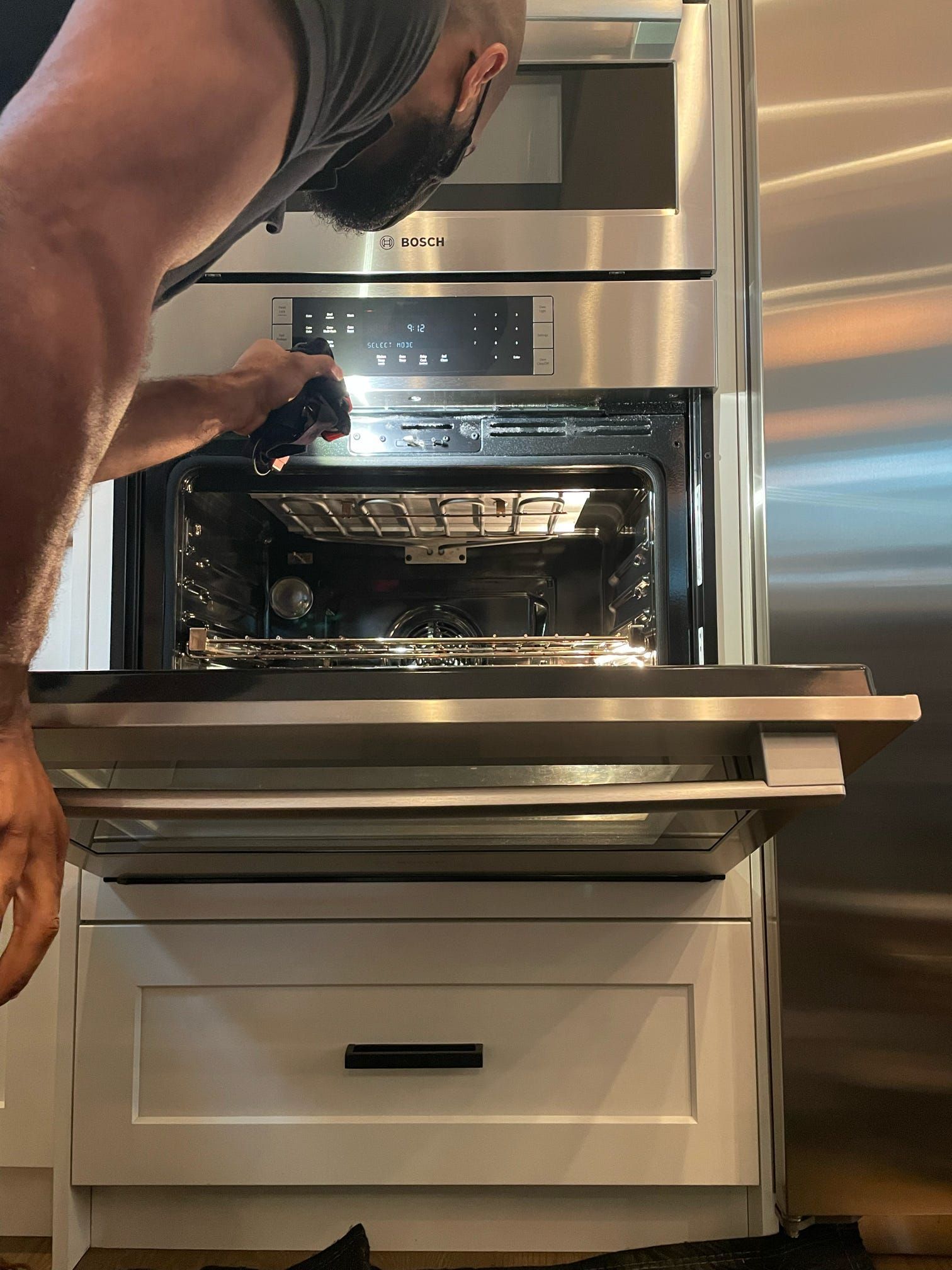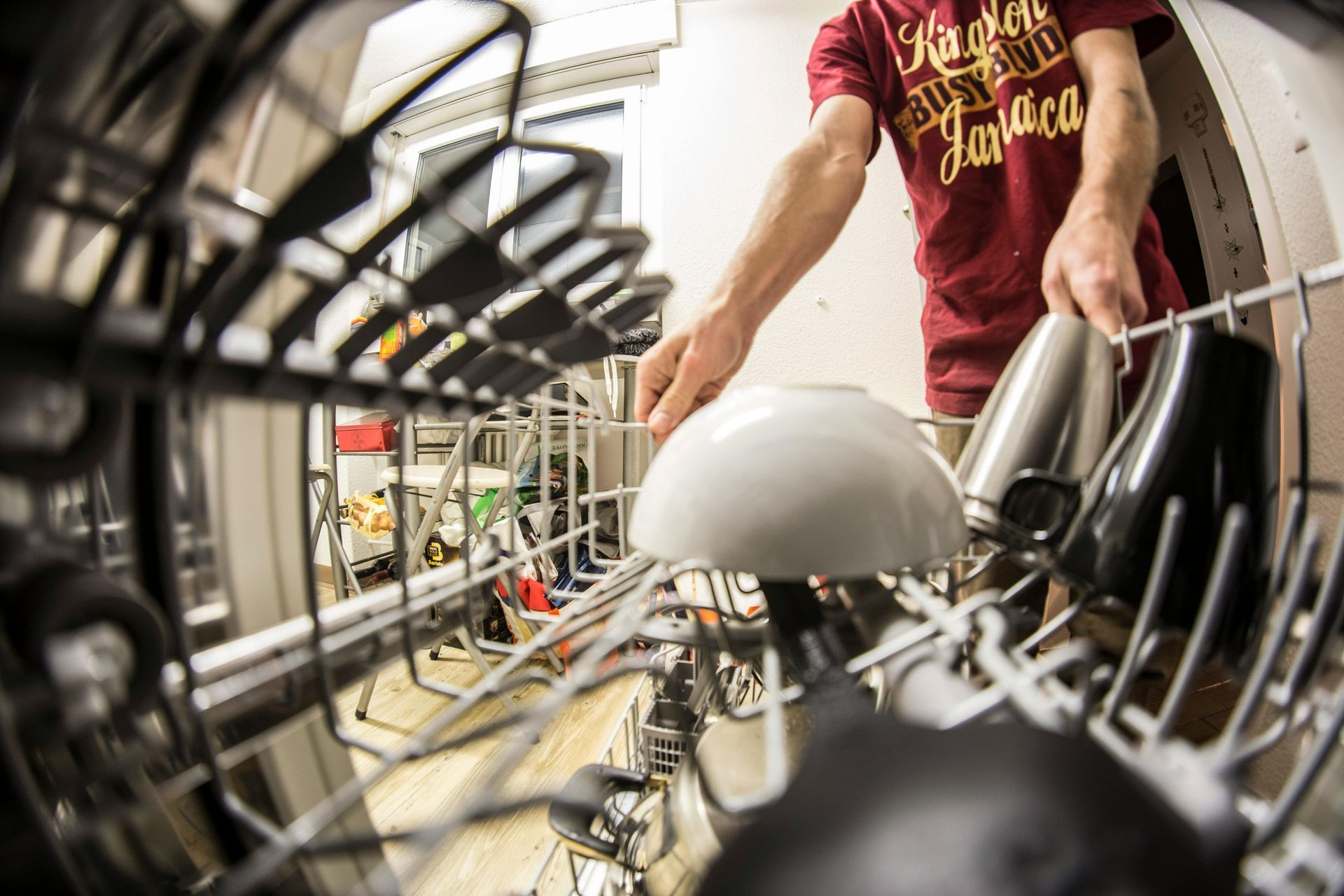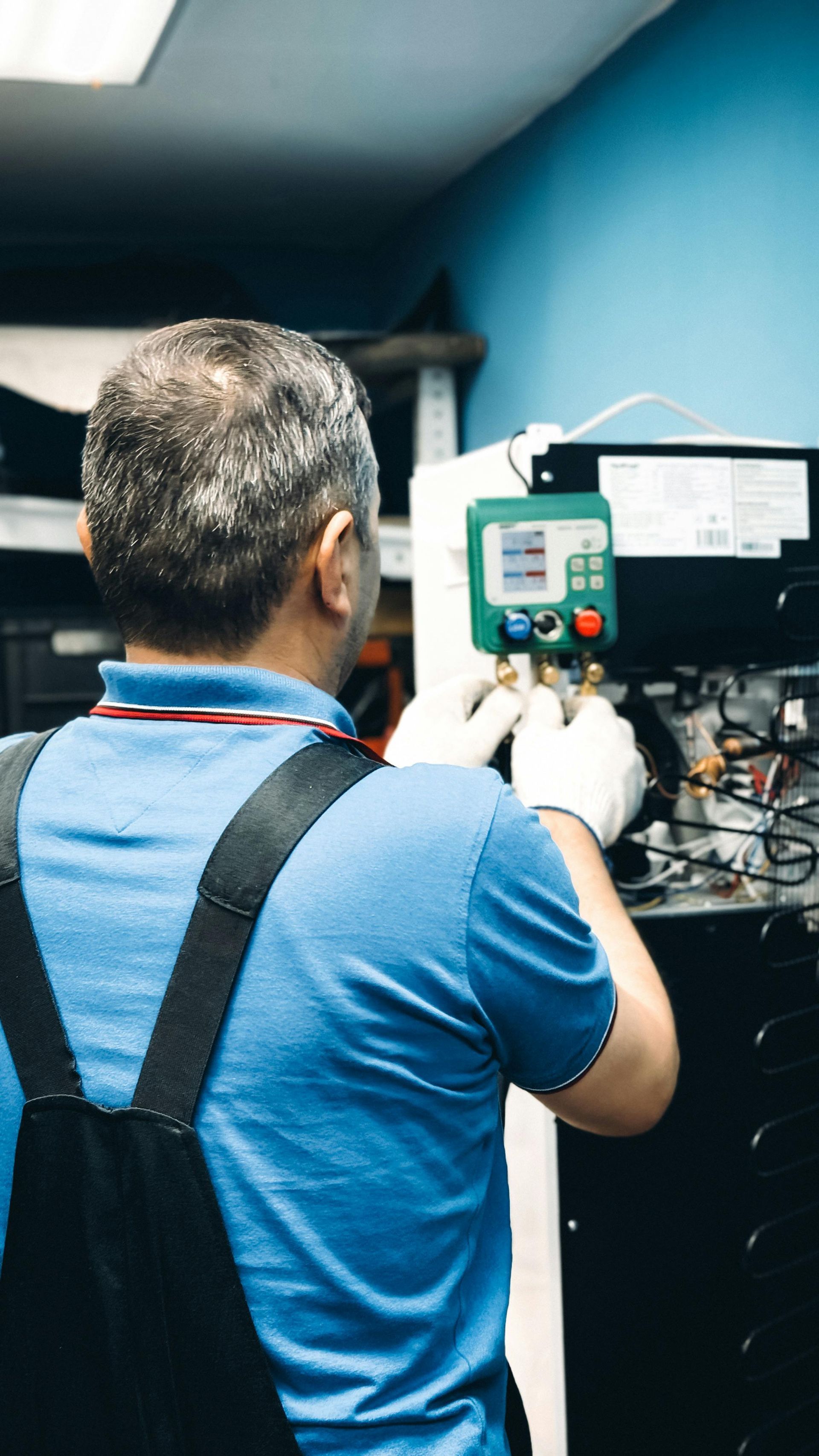How to Tell If Your Refrigerator Needs a Professional Repair
If your fridge starts humming weirdly, leaking water or acting like a stubborn ice chest with frost buildup, it’s waving a red flag for help. Notice if it can’t keep your milk cold or runs nonstop like it’s training for a marathon—these are signs something’s busted. Damaged door seals and funky smells also mean trouble’s lurking inside. If your fridge is throwing a tantrum, there’s more to learn about fixing it before things get messier.
Key Takeaways
- Unusual loud noises like humming or rattling indicate compressor or mechanical issues needing professional attention.
- Inconsistent temperatures causing food spoilage suggest thermostat or compressor problems requiring expert diagnosis.
- Excessive frost buildup or door seal failure signals defrost system issues best handled by a technician.
- Water leaks inside or around the fridge often stem from drainage or seal problems needing professional repair.
- Persistent bad odors or mold growth indicate poor conditions that require professional service to ensure food safety.
Unusual Noises Coming From the Refrigerator
If your fridge starts making weird noises, it’s usually trying to tell you something’s off. Those unusual sounds—like humming, buzzing, or rattling—can be more than just an annoying background noise. They might mean the compressor, which is the heart of your fridge, is struggling.
When the compressor has issues, it can make loud or irregular noises, signaling it’s working too hard or facing a problem. You don’t want to ignore these signs because the compressor helps keep your fridge cold, and if it fails, your food could spoil fast.
Think of your fridge like a team, and when one part acts up, the whole group feels it. So, if you hear noises that don’t sound like your fridge’s usual hum, it’s a good idea to get it checked out.
Catching compressor issues early can save you a bigger headache and keep your kitchen running smoothly.
Inconsistent Temperature Levels
Wondering why your fridge sometimes feels like a rollercoaster ride when it comes to temperature? Those sudden temperature fluctuations can mess with your food, making it spoil faster or freeze unexpectedly.
When your refrigerator’s cooling performance isn’t steady, it’s a clear sign something’s off. You might notice your veggies wilting one day and ice crystals forming on leftovers the next. It’s frustrating, right? You want your fridge to keep things just right, like a reliable buddy.
Inconsistent temperatures often point to issues like a faulty thermostat dirty condenser coils, or even a failing compressor. Before you toss out spoiled food or crank up the AC in your kitchen, it’s smart to check these signs.
If your fridge can’t keep its cool consistently, it’s definitely time to **call in a professional**. Remember, a fridge that’s a little unpredictable isn’t just annoying—it can be costly too!
Excessive Frost Buildup in the Freezer
Noticing a thick layer of frost building up in your freezer?
That usually means something’s off, like a faulty seal or too much moisture sneaking in, which can make your freezer work overtime and waste energy.
If you’re constantly scraping ice or your food’s getting freezer burn, it might be time to call in a pro before it turns into a bigger headache.
Causes of Frost Accumulation
While it’s normal for a little frost to show up in your freezer now and then, too much of it can be a sign that something’s off.
Frost formation causes can be traced back to a few common culprits, often tied to **humidity levels** inside your freezer.
Here’s what might be causing that frosty buildup:
1. Door left open too long, letting warm, moist air sneak in.
2. Faulty door seal that lets air leak, raising humidity.
3. Frequent or improper defrost cycles messing with moisture control.
4. Storing hot or uncovered food, adding extra moisture inside.
Knowing these can help you spot the problem early and keep your freezer frost-free, so you and your fridge stay cool together.
Impact on Freezer Efficiency
Excessive frost buildup in your freezer doesn’t just look like a winter wonderland—it can actually mess with how well your freezer works.
When frost piles up, it blocks air vents and makes your freezer work overtime to keep the right **freezer temperature. This means your food mightn't freeze properly, and your energy bill could spike.
Plus, all that frost can make it tough to find what you need, which is just plain annoying. **Regular frost removal is key to keeping things running smoothly.
When to Call Repair
How do you know when frost buildup has crossed the line from a minor hassle to a repair job? If your freezer looks like a winter wonderland, it’s time to watch for some serious repair signs.
You want to keep your fridge running smoothly, so don’t brush off these warnings:
1. Frost gets thicker than a couple of fingers—definitely a red flag.
2. The freezer door won’t close tightly, letting cold air escape.
3. You notice your energy bill creeping up without explanation.
4. Food starts spoiling faster than usual despite proper settings.
These maintenance tips help you catch problems early.
When you spot these signs, it’s smart to **call a pro** before the frost turns your freezer into a block of ice!
Water Leaking Inside or Around the Fridge
Notice water pooling inside or around your fridge?
That usually means something’s up with the drainage system or a common leak spot needs checking.
If you’re not sure what’s causing the drip, it might be time to call in an expert before your kitchen turns into a mini swimming pool.
Common Leak Causes
A few common culprits can cause water to leak inside or around your fridge, and knowing these can save you a headache. When you spot a puddle, don’t panic—just check these usual suspects first:
1. Clogged or frozen water source – Your fridge’s water line can get blocked or freeze up, causing leaks.
2. Condensation issues – Warm air sneaking in can create excess moisture, leading to drips and puddles.
3. Faulty door seals – If the seal’s loose or cracked, cold air escapes and moisture builds up inside.
4. Leaky ice maker or water dispenser – These handy features can sometimes spring a leak, so keep an eye on them.
Spotting these early keeps your fridge happy and your kitchen dry, so you’re definitely not alone in this!
Inspect Drainage System
Even if your fridge looks fine on the outside, a sneaky clogged drainage system can cause water to pool inside or spill onto your floor. You mightn't notice at first, but that drainage blockage can turn into a real headache.
Check the drain hole at the back or bottom of your fridge—if it’s blocked, water can’t flow out properly. Cleaning it out with warm water or a little vinegar usually does the trick.
Think of it as system maintenance for your fridge’s “plumbing.” Keeping that drain clear helps prevent leaks and keeps your fridge happy.
When to Call Expert
If cleaning out the drain didn’t do the trick and water keeps pooling inside or around your fridge, it might be time to
call in an expert.
Don’t stress—experts can save you from bigger headaches and surprise repair costs.
Here’s when you should dial the pros:
1. Water leaks keep coming back despite your maintenance tips.
2. You notice puddles growing under or behind the fridge.
3. The fridge sounds weird, or the temperature is off.
4. Mold or funky smells hang around the wet spots.
Refrigerator Is Running Constantly Without Cooling
When your fridge keeps humming like it’s training for a marathon but doesn’t actually get cold, something’s definitely off. This usually means your refrigerator is running constantly without cooling, which can be a real headache.
The culprit could be refrigerator compressor issues or temperature control malfunctions. Both mess with the cooling cycle, making your fridge work overtime while your food stays warm. You’re not alone in this—many folks face it and wonder if they should call a pro. Here’s a quick snapshot to help you spot the problem:
| Symptom | Possible Cause | What You’ll Notice |
|---|---|---|
| Constant running | Compressor issues | Loud humming, no cold air |
| Warm interior | Temperature control malfunctions | Food spoiling faster |
| Frequent cycling | Malfunctioning thermostat | Noise changes, uneven cooling |
If your fridge matches these signs, it’s time to get a pro involved before things get worse. Your food—and budget—will thank you!
Door Seals Are Damaged or Not Closing Properly
Since your fridge door seals keep the cold air in and the warm air out, any damage or improper closing can cause big trouble.
If your door seals are cracked, torn, or just not sealing right, your fridge works overtime, wasting energy and hiking up your electric bill. Proper door seal maintenance isn’t just about keeping things cool; it’s about saving you money and hassle.
Here’s how to check if your door seals need a little TLC or a pro’s touch:
1. Look for visible cracks or gaps along the seal.
2. Close the door on a thin piece of paper—if it slips out easily, the seal’s not tight.
3. Feel for cold air escaping around the edges.
4. Notice if your fridge seems louder or runs longer than usual.
If any of these sound familiar, it’s time to call in a pro to boost your **energy efficiency** and keep your fridge happy.
Presence of Strange Odors or Mold Growth
Even though your fridge might seem like a clean, cold box, strange odors or
mold growth can sneak in and cause a real headache.
If you notice funky smells when you open the door, that’s a red flag. It could mean spoiled food is hiding, or worse, moisture is building up inside. Mold doesn’t just look gross—it can mess with your health and your food’s safety.
You might try quick fixes like wiping down shelves or tossing smelly leftovers, but sometimes you need professional odor elimination to really tackle the problem.
Mold prevention is key, so if your fridge isn’t cooling right or the door seals are off, that creates a perfect breeding ground for mold.
Don’t ignore these signs or you’ll end up with a stinky, unhealthy fridge. Calling a repair expert can save your food and your nose, keeping your kitchen fresh and welcoming for everyone.
Frequently Asked Questions
How Often Should I Clean the Condenser Coils?
You should stick to a coil maintenance routine by cleaning the condenser coils every 6 months. This cleaning frequency helps your fridge run efficiently and keeps you part of the home care community that values proper upkeep.
Can a Power Surge Damage My Refrigerator?
Think of a power surge as a sudden storm hitting your fridge’s delicate circuits. You’ll want to practice good refrigerator maintenance to shield it from power surge effects and keep your kitchen community running smoothly together.
What Type of Refrigerant Does My Fridge Use?
You’ll find your fridge’s refrigerant type on a label inside or at the back. Many use common types like R134a or R600a, with eco-friendly options becoming popular. Join others choosing greener refrigerant types today!
How Long Is the Typical Refrigerator Lifespan?
Coincidentally, your refrigerator can last about 10-20 years with proper refrigerator maintenance. If you join others who prioritize appliance longevity, you'll enjoy reliable cooling and save money by avoiding premature replacements.
Is It Safe to Unplug the Fridge for Repairs?
You should always prioritize unplugging safety by disconnecting your fridge before repairs. Timing matters—unplugging too long can spoil food, so plan repairs quickly to keep things cool and stay connected with your home’s rhythm.
Final Thoughts
If your fridge is acting up, don’t just shrug it off or try a quick fix that might make things worse.
Calling a pro might sound pricey or like a hassle, but it’s worth it to avoid a spoiled mess or bigger repairs down the line. Plus, a well-running fridge means less stress and more cold drinks when you need them. So, trust your gut—getting expert help can save you time, money, and headaches.




